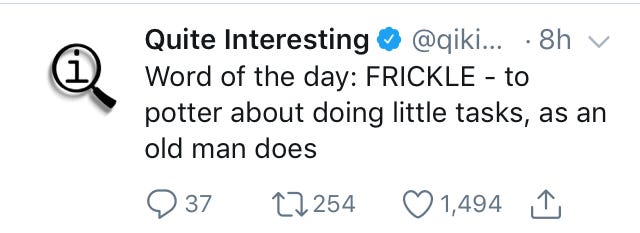My partner is away on business, scintillating on a conference stage in Chicago. His kids, whom I call the Stepgoblins, are at their mother’s beautiful, angular, echoing house. And so I’m alone here in the place all four of us call home sometimes, frickling away the hours.
I pour the last cup’s worth of coffee out of the pot, and then fill and rinse it to make another. We are chain-coffee-drinkers in this house, and I am no less of one when I’m by myself. As the new pot percolates, I rotate the dishes: putting all the clean ones away and filling the dishwasher with the dirty ones. I check on the laundry. I use that yellow all-purpose Windex on the white fake-marble countertops and bar. I take some ibuprofen for my back. I sip more coffee. I add a couple things to the grocery list. I bring up some more tabs in my browser, for research purposes later, and compile an invoice for my violence arts work for Drake Middle School. Oops: I stepped in water as I did the dishes—got to change my socks. I thump the couch cushions and throw pillows before I sit, to compose an outline for my next essay. Is this pottering (or puttering, as I prefer to call it)? Or is it housework? Chores, or frickling? I feel like, at least normally, dishes are a “little task,” but for many that would be considered a chore. Does one only frickle if one lives alone? What if I’m not an old man?
I have already mused about this vocab word, when I first wrote from it as a prompt, back in the Before Times on a pen-named blog. I wondered, then, what it was that makes the practice of frickling puttering about like an old man does. What makes frickling an old man’s game, and do women of any age ever frickle? I mean I’m definitely frickling today, though I’m not an old man. Or is what I’m doing women’s work instead? What’s the difference?
I never came up with an explanation why it’s frickle that an old man does, not an old woman, and I don’t think I’m any closer to an answer today. But I’m definitely doing it. I think. Maybe it’s because mostly, old women are not performing little tasks, but keeping a house going, parenting or otherwise caring for other humans; and those are all big things. I mean, before I moved in here, when I was alone in the Birdhouse, I wasn’t a caregiver of any kind, to anyone. I kept house in a small space, which was, I suppose, a small thing and only for me, and so my puttering was like an old man then, not an old woman.
Then again, I’ve been called a “terrible girl” for a long time—ever since I was a kid. I was a “tomboy” first when I was little, then I had “androgynous” taste in fashion as a teen. Androgynous was our term for any non-conforming gender expression back in the ‘80s and even through the ‘90s, and so that’s what I was. And then in my 20s when I joined the swordfighting troupe, that band of merry men who terrorized the Colorado Renaissance Faire with our swashbuckling art and our dudebro energy, I was literally told that I was “one of the guys, but with tits, so you’re safe.”* So maybe I’m frickling because I’m a lot more like an old man than I am like an old woman, by nature?
Though of course, a gender stereotype is only just that. As we all know, we who know and love good fathers and male empaths and sensitive, loving men of all stripes and types. Personally, the most loving caregivers (let alone the fiercest feminists) I know tend to be cis-het men. The women in my life are a much harder, harsher, more selfish people in general. Though I do recognize that my data pool is tiny. But hey, all anyone knows is their own experience, right? Plus trust in others’.
Anyway, I have to go: the garbage needs taking out and I really should sweep the kitchen floor.
*I have a whole essay centered around this concept that was first published in my Problematic Tropes series over on Writers’ HQ, which I then expanded to become a chapter in my memoir that I’m shopping around now. I’ll likely be re-posting all the Problematic Tropes here on Wednesdays for paid subscribers once my Sherlock reviews are over with, so I’d definitely consider upgrading to paid if you haven’t done so yet. Those are some fun essays, and I can’t wait to revise and tinker with them a little more for this audience. But long story short (too late!): that phrase is a big part of my life—it’s central to my gender expression, and to who I am and how I fit this wild uncommon shape into the world.
AUTHOR’S NOTE: this musing was written last week, based on a seed word/idea from 2019. This week, the stepgoblins and partner are back home, chattering and cooking and tinkering with guitars and eating lots of good food, leaving empty cans of sparkling water around, and giving the best hugs in all of Colorado. You know. Pottering about doing little tasks, as young and middle-aged men do.





“Personally, the most loving caregivers (let alone the fiercest feminists) I know tend to be cis-het men. The women in my life are a much harder, harsher, more selfish people in general. Though I do recognize that my data pool is tiny.”
Our data pools sound similar. Thanks for writing this. Walking through life as a misfit gives one a different perspective and, I think, allows one to ask questions.
That should read: “conforming.” 🙃